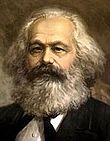- Democratic Marxism
-
Part of a series on Marxism  Social sciencesAlienation · Bourgeoisie
Social sciencesAlienation · Bourgeoisie
Base and superstructure
Class consciousness
Commodity fetishism
Exploitation · Human nature
Ideology · Proletariat
Private property
Reification · Cultural hegemony
Relations of production
Scientific socialism
ImmiserationCapitalist mode of production
Socialist mode of production
Capital accumulation
Commodity (Marxism)
Marxian economics
Communism
Economic determinism
Labour power · Law of value
Means of production
Mode of production
Perspectives on Capitalism
Productive forces
Surplus labour · Surplus value
Transformation problem
Wage labour · Crisis theoryHistoryCategoriesAll categorised articlesCommunism portal 
Democratic Marxism is a description used when a Marxist system has an emphasis on a democratic orientation rather than the traditional authoritarian system commonly associated with Marxism. Democratic Marxism is contrasted with a purely authoritarian system commonly used to define the terms of redistribution of wealth and state control. Instead, democratic Marxism uses a democratic form of government. Democratic Marxism is also starkly different from democratic socialism because the latter implies that the government owns the means of production,[1] but Marxism implies a redistribution of wealth and an abolition of private property[2][3] similar to a communist system.
According to Kenneth A. Megill in his book The New Democratic Theory:
- "Democratic Marxism is authentic Marxism--the Marxism which emphasizes the necessity for revolutionary action. Loyalty to the movement, not loyalty to any particular doctrine, is characteristic of the orthodox democratic Marxist."[4]
In his book Chile's Democratic Road to Socialism, Michael H. Fleet also uses the term democratic Marxism to describe the nature of the Chilean government at the time of Salvador Allende's presidency:
- "During at least two of the three years of democratic Marxist government, however, Chile faced severe economic and political crises."[5]
Democractic Marxism is very different from other Marxist systems that exclusively use authoritarian governmental coercion without "the people" being in control. Democratic Marxism implies a type of democratic "rule of the people" commonly associated with democratic republics. In other words, the government derives its power from the people through a social contract. In this political system, the government is a tool to be used by the people rather than exclusively for the elite. This democratic system is similar to many constitutions in the sense that they put the power of government into the hands of the people. Although it is rare, democratic Marxism has existed in history and cannot be fully represented by the general term Marxism.
This political philosophy is embraced by the New Democratic Marxist-Leninist Party of Sri Lanka.[6] The New Democratic Party's home page says the following: "The NDP upholds Marxism-Leninism-Mao Zedong Thought as its guide. It recognizes the national question as the main contradiction in the Sri Lankan society and has persevered in relentless struggle for social justice against imperialism and regional hegemony as well as forces of chauvinism and local reaction."[7] Although neither Lenin nor Zedong were known for endorsing democracy, the New Democratic Marxist-Leninist Party of Sri Lanka works within the democratic structure to pursue their marxist agenda.
Most previous Marxist systems used some form of authoritarianism or made an attempt to establish an authoritarian force. Karl Marx expresses a clear disdain for the democratic system:
- "The oppressed are allowed once every few years to decide which particular representatives of the oppressing class are to represent and repress them." -Karl Marx
The merits of both the authoritarian system and the democratic system are debatable. However, It is necessary[says who?] to recognize Marxism within a democratic structure rather than only recognizing Marx's idea of what Marxism should be: The establishment of an authoritarian system which would be used to carry out his economic theory.
Marxism is primarily an economic and social theory rather than a specific political system. Democratic Marxism is introducing these philosophic principles into a democratic system of government.
References
- ^ "Socialism is an economic system in which the means of production are either state owned or commonly owned and controlled cooperatively; or a political philosophy advocating such a system."
- ^ Marx, Karl, and Friedrich Engels. The Communist Manifesto and Other Writings. New York: Barnes & Noble Books, 2005. Print. Page 28: "Nevertheless in the most advanced countries, the following will be pretty generally applicable: 1. Abolition of property in land and application of all rents of land to public purposes. 2. A heavy progressive or graduated income tax. 3. Abolition of all right of inheritance."
- ^ See above reference. Page 21: "In this sense, the theory of the Communists may be summed up in the single sentence: Abolition of private property."
- ^ The new democratic theory - Kenneth A. Megill - Google Books. Books.google.com. 2008-10-10. http://books.google.com/books?id=owuDAAAAMAAJ&q=%22Democratic+Marxism%22&dq=%22Democratic+Marxism%22. Retrieved 2011-10-28.
- ^ http://www.jstor.org/pss/447149
- ^ Statement of the New Democratic Marxist-Leninist Party on the 18th Amendment to the Constitution
- ^ :. New Democratic Party - Sri Lanka
External links
Wikimedia Foundation. 2010.
